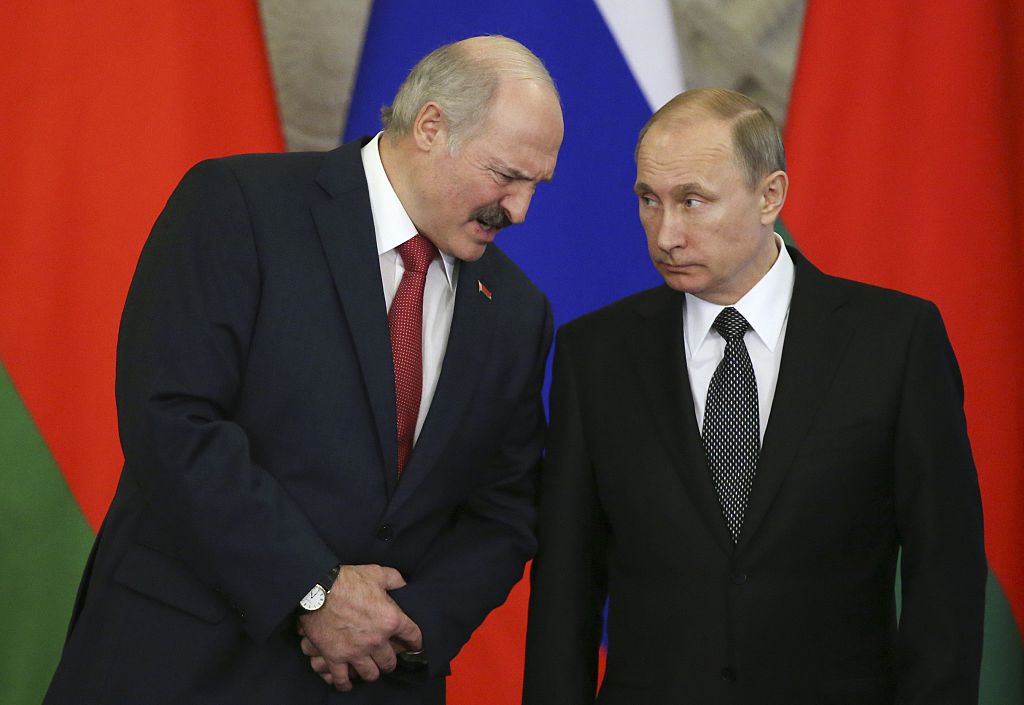The last time Russia held an international sporting event during a climate of détente with the United States, it annexed a significant portion of its neighbour’s territory several weeks later. As it turned out, Obama’s ‘reset’ years and the Sochi Winter Olympics, were the lull before the swift and subtle storm in which Ukraine lost the Crimea to around 20,000 Russian troops wearing face masks and bandanas.
For the enthusiasts of historical parallelisms, the Soccer World Cup and President Trump’s near-fawning public proclamations over the Russian premier might very well chime a few early warning systems. Particularly if you happen to live in Belarus, a sparsely populated and foresty nation to the western edge of Russia. Looking out across the borderlands of his eastern neighbours, the Belarusian president, Alexander Lukashenko, recently gave officials a dark and foreboding warning: “We are on the front line. If we don’t survive these years, if we will fail, it means we will have to become part of some other state, or they will simply wipe their feet on us. God forbid they unleash another war, like in Ukraine.”
Trump’s day in Helsinki will have done little to assuage Lukashenko’s fears. Conciliations and fine words periodically provide a pleasant respite from the turbulence of East-West relations, but they have have done nothing to secure the borders of the post-Soviet space. When George W. Bush claimed to have found Putin’s soul glistening inside the depths of his pale grey eyes, the Kremlin returned the favour by bombing Georgian cities indiscriminately for five days during August 2008.
Similarly, Obama’s play at chumminess with the nice-but-dim stand-in, Dmitri Medvedev, did nothing to bring Russia to heel. A reduction in arms sanctions; the US’s backing of a Russian bid to join the WTO; and a photoshoot of the two leaders enjoying a burger in D.C.: all would soon be long forgotten when Russia stole a hunk of Ukrainian soil right from beneath the noses of the international order.
Under the current US administration, Putin may even have found his most irenic counterpart to date. Though Trump did not go so far as to commit to an easing of sanctions in Helsinki (which is by no means off the cards for the future), he did, in effect, grant Putin’s most dearly held desire by elevating Russia – a nation whose GDP is 12 times smaller than America’s, whose military has a budget 11 times meaner – to the rank of equal by treating it to a Cold War style summit. Moreover, the President’s apparent willingness to forgive Putin all his transgressions will be cause enough to deprive several adjacent leaders of their night’s sleep.
Time was when the Baltic states, and in particular Estonia whose ethnic Russians make up a quarter of the population, thought they would be next on Putin’s shopping list after Crimea. But since then military budgets have swelled (Estonia is currently the fourth biggest military spender in Europe by GDP) and NATO has shown no signs of wilting in the face of Russian belligerence, as Trump’s recent commitment to continued support shows.
Belarus on the other hand doesn’t have the luxury of being able to take shelter beneath NATO’s protective umbrella. During its short history of independence, it has mostly been seen as an extension of Russia due to an almost total dependence on its neighbour for economic resources, the two countries’ military integration and its despotic leader’s paliness with Putin.
In the aftermath of 2014, however, that relationship has shown signs of strain as Lukashenko seeks to balance its ties between the West and East, much as Ukraine did in the run up to 2014. Now after nearly 25 years of authoritarian rule over Belarus, Lukashenko finds himself grappling with the possibility that Russian goodwill may not last forever.
Added to that, there exists enough Belarusian Russophiles yearning for the good old days of the Soviet Union to grease any potential future coup. This hasn’t gone unnoticed in Minsk: attempts at derussification over the last few years include arrests of pro-Russian journalists and the banning of pro-Russian opposition parties.
If Belarus is the next neighbour to be swallowed up by Russian neo-imperialism, it’s hard to see that a united western front would develop to rush to the aid of a backwater nation ritually designated the title of ‘Europe’s last dictatorship’. Hell, the two countries are so similar anyway, we might even let Putin get away with convincing us that it was ‘the right thing to do’. (At which point the bells really should start ringing for the enthusiast of parallelisms.)
Signs of détente and de-escalation after four years of hybrid war between Russia and the United States is no bad thing. But it’s worth remembering that Russia has a tendency to terrorise its backyard during times like these. Belarus knows that, and will be watching intently the mood swings of the most mercurial President during his most testing diplomatic encounter yet – and hoping he doesn’t get too close.

























